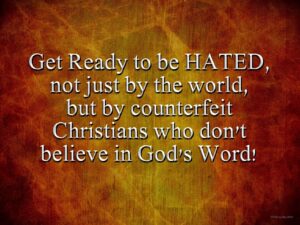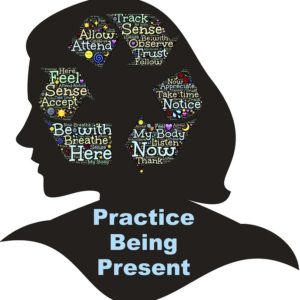 By Marsha West – Christian Research Network
By Marsha West – Christian Research Network
Here I go again reporting on high-profile Christians who have shown a stunning lack of biblical discernment. I’ll begin by defining spiritual discernment and then I’ll name names. According to Got Questions discernment is “the ability to distinguish, to separate out by diligent search, to examine.” GQ reminds us that without the Spirit, the things of God are “foolishness.” (1 Corinthians 2:14)
It is the Holy Spirit that gives born again believers the mind of Christ. The Spirit gives us wisdom and discernment. Only those who are Spirit filled can properly distinguish between true and false teaching. How does one find the truth? By diligently searching the scriptures. (Acts 17:11) Revealing the names of people who lead us down the primrose path is not just scriptural, it is imperative that the Body of Christ know who the culprits are. So hold on to your hats while I expose two women you need to know about. Even though both are best-selling authors, speakers, and are frequent guests on popular podcasts, some of the people they laud are dangerous heretics, i.e. wolves in sheep’s clothing.
I urge you to take time to ponder what I have to say here and then ask yourself this question: Are the things of God foolishness to me?
Come, Let Us Reason Together
Many who claim to be followers of Christ are completely oblivious to what a Christian worldview should look like, and from my experience many simply don’t care, even though the Bible has a ton to say on this subject. Those who read and study the Bible are few and far between….including people who say they love Jesus, attend church, wear crosses, and get Bible verses tattooed on their bodies.
I’ve asked these questions umpteen times but I’m going to ask them again: where does a person discover the truth about God’s only begotten Son? Where does a person discover what they need to know about the work of the Holy Spirit? How will those who profess a belief in Jesus Christ know how to live a life that’s pleasing to Him? The answer to these questions is that believers must read the Holy Spirit inspired Bible.
In the pages of Scripture God makes it clear that His chosen ones are to have nothing to do with pagan and apostate religions and yet many self-professed followers of Jesus do the exact opposite of what God requires of them.
As you are about to see, even highly regarded Christian leaders and clergy sometimes toss discernment out the window for reasons known only to them.
Desert Fathers Leave Protestants High And Dry

Most Evangelicals aren’t familiar with Henri Nouwen. And why would they be? He was a Roman Catholics priest. A number of years ago I addressed my concerns about Catholic mystic priests in The Low-Information Evangelical because quite a few prominent Christians were quoting from and recommending books by Catholic Trappist monks dubbed the “Desert Fathers.” The names most recommended at the time were Meister Eckhart, Ignatius of Loyola, St. John of the Cross, Teresa of Avila as well as priests who took up where they left off: Thomas Merton, Thomas Keating, William Meninger, Basil Pennington and Henri Nouwen. As time goes by, more names have come to my attention. One man who’s now on my radar is Brother Lawrence. The reason for this addition is because in Joni Eareckson Tada’s recently published devotional, The Practice of the Presence of Jesus: Daily Meditations on the Nearness of Our Savior, he is referenced and quoted. Amazon’s promo says this about Joni’s book:
Discover the joy of intentionally dwelling in the presence of God as the beloved author of Joni weaves contemporary insights with the timeless wisdom of seventeenth-century monk Brother Lawrence.
Review by Philip Ryken, president of Wheaton College:
The Practice of the Presence of Jesus celebrates the legacy of Brother Lawrence, bears witness to Joni’s remarkable life of faith, and most of all, honors the Savior they both love. With remarkable biblical, theological, emotional, and artistic range, these daily devotionals touch on nearly every aspect of our walk with God. The result is a new devotional classic that bears marks of the author’s suffering and also sings with ineffable joy. It is not merely Christ-centered; it is Christ-saturated.
Following is two of the many comments you’ll find on GoodReads:
Every chapter of Tada’s book begins with a quote from Lawrences’ book. In reading Tada’s book, the reader will become familiar with Lawrences’ book.
And this…
I thought the book’s introduction did a good job of summarizing Joni and Brother Lawrence’s difficult path each has walked. I knew some of Joni’s but I did not know Lawrence’s. Both suffered immensely, to overcome the obstacles in their lives, they learned to rely on their faith and ongoing communication with their Lord. This book filled me with comfort, encouragement, and a new insight on life.
It also contains Roman Catholic theology and teaches mysticism.
Pastor Dean Good, Grace Church of North Olmstead, wrote a review of Brother Lawrence’s popular book The Practice of the Presence of God. In brief, Pastor Good begins by revealing that Brother Lawrence uses no Scripture in his book, something I find troubling. Equally troubling is that he teaches mysticism. Good defines mysticism as a “…direct communion with God apart from the rational. It is pure experience (emotional, sensual) usually arrived at by a method and is generally divorced from thinking. I should point out that mysticism always bypasses simple faith in the finished work of Christ on the Cross and repentance from sin. Method trumps or rather replaces faith.”
Good also addresses the monk’s teaching on salvation by works. Here’s a quote from the book:
Since entering upon the religious life, I no longer perplex myself with thoughts of virtue, or of my salvation. But having given myself wholly to God, to make what satisfaction I could for my sins… p. 99 (author emphasis)
As well, he reveals the monk’s teaching on asceticism which is an aspect of mysticism. “There is virtually nothing Biblical regarding God’s presence in this book,” concludes Pastor Good.
Given all this, it saddens me to say that my trust in Joni has eroded.
Feed My Sheep.

As a blogger, I’ve written on cultural issues (abortion, LGBTQ agenda), politics, New Age, occult/sorcery, pseudo-Christian cults, false teaching/teachers, social justice/wokeness, and more. It is within this framework that I recently took issue with a pastor of a local church who became enamored with Roman Catholic mysticism and passed it on to the congregation as if this was biblical. I fear that, perhaps without realizing it, well-intentioned Protestants like that shepherd have pulled undiscerning sheep into dangerous Eastern mysticism and rituals. One example is Contemplative Prayer. What scores of people don’t realize is that CP is associated with an apostate religious system that teaches a false gospel, i.e. Roman Catholicism. Enter Fr. Henri Nouwen.
One of the people most often quoted by Protestants is Catholic priest, theologian and “Catholic Zen Buddhist,” Henri Nouwen. In my research I learned that upon Nouwen’s death it was discovered in his journals that he struggled with homosexual temptation throughout his life. Even though “there is no evidence that he broke his vows of chastity,” the priest desired to have sex with men.
The late Ken Silva confirms that the “gentle priest,” as he was affectionately called by Rosaria Butterfield in her book The Gospel Comes with a House Key, practiced contemplative (listening, centering, breath) prayer in an altered state of consciousness. Silva warned about this:
In a piece I penned, Dallas Theological Seminary Faculty Recommends Henri Nouwen With His Contemplative Prayer, I revealed that, from his books, Henri Nouwen—even today—remains a veritable superstar teacher of this spurious Contemplative Spirituality/Mysticism.
Further…

Nouwen’s main claim to fame was teaching the practice of so-called “Christian” meditation a.k.a Contemplative Centering prayer; transcendental meditation lightly sprinkled with Christian terms. This is what he [Nouwen] means by silence and solitude….His practice of it would ultimately lead him to teach universalism. Near the end of his life Nouwen would muse:
“Today I personally believe that while Jesus came to open the door to God’s house, all human beings can walk through that door, whether they know about Jesus or not. Today I see it as my call to help every person claim his or her own way to God.” (Source)
If that quote isn’t enough to convince you that Nouwen taught universalism, take a gander at what he said here:
I am deeply convinced that Jesus is completely unique in the world as the full revelation of God’s life, but I also believe that many people can come to Christ even when they have never formally known Christ or had the opportunity to accept him. The final judgment, as Jesus says, is not based on whether or not they have known Jesus but whether or not the people have cared for those who are hungry, naked, prisoners, all the people in need. (emphasis mine)
This, brethren, is the Social Justice gospel which is works based.
Remember, we are talking about a Catholic luminary who’s often quoted by Protestants and Evangelicals. Nouwen came to believe that all human beings, saved or unsaved, will spend eternity in heaven whether they know about Jesus or not.
A Gentle Priest Or A Ravenous Wolf

There’s an abundance of evidence that the late and “gentle priest,” Henri Nouwen, would be viewed by most Protestants as a wolf in sheep’s clothing if they knew that the queer theologian advocated for same-sex marriage and was entrenched in Eastern religions to the point of promoting both Hinduism and Buddhism. The Apostle Paul, inspired by the Holy Spirit, called homosexuality an abomination (Romans 1:26-31). There are many examples in Scripture that God hates “feet that rush to evil (sin).” So, ask yourself this: why would a Catholic priest and theologian become all wrapped up in lusts of the flesh that God hates?
According to Orrel Steinkamp:
The source of Contemplative Prayer, unquestionably, is Roman Catholicism. But ironically there are probably more evangelicals pursuing this prayer method than Roman Catholics themselves. In recent times Roman Catholic monks Thomas Merton and Henri Nouwen have devoted their entire lives to this prayer method and now many evangelicals are devoting themselves to apostate gurus like Merton and Nouwen. Contemplative Prayer is essentially a meditative discipline with a desire to attain an altered state of consciousness by entering the “silence.” In this silence, and out of this silence, one supposedly attains oneness with God.
But entering the silence is not easy; and so, an innovative Roman Catholic monk Thomas Keating—a close friend and associate with the late Merton—employed a Centering Prayer technique of repeating a chosen word known as a mantra…What formerly took monks months and years can now be attained in 20 minutes of Centering Prayer and repeating a mantra over and over. In the silence one supposedly finds God living deep in their unconscious being.
The rub is this. This internal God is also believed to be deeply buried in the unconscious of every other human alive today on the planet and even actually inhabits all created things. So this form of panentheistic meditative ecumenism eventually connects the contemplative not only to Roman Catholicism but all of creation. Roman Catholic monks Merton, Nouwen, and Keating are like the trinity of Contemplative Prayer. The fact is, this practice of Contemplative Prayer only serves to blur the line between Roman Catholics and Protestants. (Emphasis mine) Source
Professing believers who have promoted mystical spirituality are Tim Keller, Chuck Swindoll, Rick Warren, John Piper, Louie Giglio, Beth Moore, Richard Foster, Dallas Willard, Leonard Sweet, Larry Crabb, Phillip Yancey, David Jeremiah, Sid Roth, Dallas Jenkins, Ruth Haley Barton, Tony Campolo, Jim Wallis, John Ortberg, Sarah Young and Priscilla Shirer to name a few.
In his book Contemplative Mysticism: A Powerful Ecumenical Bond, David Cloud observed:
Catholic mysticism leads inevitably to a broadminded ecumenical philosophy and to the adoption of heresies. For many, this path has led to interfaith dialogue, universalism, pantheism, panentheism, even goddess theology. (Source)
The Domino Effect
Rosaria Butterfield, who is a scholar, failed to do the research on Nouwen, or perhaps she did it and was unconcerned that he was a troubled man and a controversial figure. My own research revealed that “he was a popular speaker for youth social justice conferences, two of his favorite authors were Jim Wallis and Richard Foster, and he was a frequent contributor to [progressive] Sojourners.” In On Christians Recommending Contemplative Henri Nouwen John Lanagan laments:
It is wrong to promote a practitioner of The Silence. Henri Nouwen’s particular universalist understanding of God is the result of his contemplative practices; and yet his books continue to be recommended.
 Not only did Rosaria favorably cite Nouwen in her book she also listed one of his works in the Recommended Reading list. The pastor I previously mentioned did the same, with the difference being he quoted Nouwen during a sermon. He even suggested purchasing the priest’s books as a Christmas gift. The last thing a shepherd should do is recommend that his sheep ingest the poison of a false teacher/heretic which often leads them into the numerous dangerous movements that are spreading globally. Christians with a platform have a duty to warn people about wolves in sheep’s clothing; we’re not to pet wolves!
Not only did Rosaria favorably cite Nouwen in her book she also listed one of his works in the Recommended Reading list. The pastor I previously mentioned did the same, with the difference being he quoted Nouwen during a sermon. He even suggested purchasing the priest’s books as a Christmas gift. The last thing a shepherd should do is recommend that his sheep ingest the poison of a false teacher/heretic which often leads them into the numerous dangerous movements that are spreading globally. Christians with a platform have a duty to warn people about wolves in sheep’s clothing; we’re not to pet wolves!
I’ll close with three quotes. The first one is from a blogpost I wrote where I cautioned my readers that,
Listening to God does not require you to “empty” your mind. This meditative practice, called Lectio Divina a.k.a. spiritual formation…the silence…best known as contemplative/listening/centering prayer is a growing trend in evangelical churches even though this sort of prayer ritual comes from teaching associated with Catholic mystics. Sadly, there was no warning about Nouwen from Rosaria. Thus, many of her followers have no clue that, even though he did some good in this world, as many Catholics do, Henri Nouwen was a heretic. My concern from the get-go was that some of her readers are going to be drawn into his sphere of influence — and that is heartbreaking.
I wrote those words in 2020. My view at the time, and the view of others, was that Rosaria showed a lack of discernment. Since then she has changed some of her heretical views and has publicly repented. Bravo!
The second is another quote from John Lanagan:
Where Rosaria needs correction, may the Lord give her the grace to accept it. And may her critics remember she is a sister in Christ.
This also applies to Joni.
Lastly, a warning from The Dissenter:
In today’s contemporary professing church, a diluted image of God has been crafted in the minds of men—one that’s all mercy, patience, and tolerance, stripped of His righteous wrath, justice, and even His holy hatred for sin. This cancerous “love wins” ideology portrays a God who is endlessly permissive, neglecting the severity of His judgments and the reality of His ultimate authority.
Related
Can ‘Brother-Lawrence’ be viewed as Brother in Christ’? By Cecil Andrews
A Response To Dr. Butterfield’s Recent Words On Intersectionality By Hiram Diaz
The Roman Catholic Church Hasn’t Changed its Condemnation of the Gospel By Ken Silva
Brother Lawrence Joni Mysticism dangerous contemplative warnings / The Chosen / Joni Eareckson Tada – Doreen Virtue
Entering “The Silence” (Posting this with a warning)
Watch: 1. Prayer in Secret, from Six Continuing Sessions by Thomas Keating
Join Marsha West on Facebook and MeWe
Copyright July 6, 2024. All rights reserved.